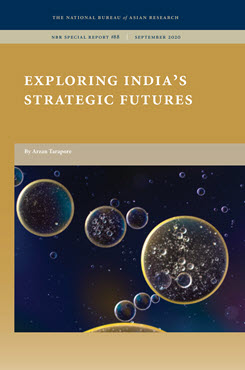NBR Special Report no. 88
Exploring India's Strategic Futures
This report uses a novel alternative futures methodology to demonstrate that India’s strategic preferences are not fixed but could vary discontinuously under different environmental conditions.
Executive Summary
MAIN ARGUMENT
The method of major/minor trends developed in this report suggests that the roots of apparently surprising future behavior can be found in a close reading of a target state’s history. Using this method, the report outlines three unlikely but plausible alternative futures of India as a strategic actor. The first scenario envisions India as a Hindu-nationalist revisionist power hostile to Pakistan but accommodating of China; in the second, it is a militarily risk-acceptant state that provokes dangerous crises with China; and in the third scenario, India is a staunch competitor to China that achieves some success through partnerships with other U.S. rivals like Russia and Iran. These scenarios are designed not to predict the future but to sensitize U.S. policymakers to possible strategic disruptions. They also serve to highlight risks and tensions in current policy.
POLICY IMPLICATIONS
The scenarios yield at least three major analytic insights that are relevant for today’s policymakers:
- India will continue to face difficult trade-offs in managing security threats from Pakistan and China. A redoubled strategic focus on Pakistan will almost certainly come at the expense of Indian capacity to compete with China in the Indian Ocean region.
- A more confident and risk-acceptant Indian military may inadvertently pose strategic threats to the U.S. The U.S. may feel compelled to support India in future crises involving China; or even absent such a commitment trap, India-China crises are likely to jeopardize regional stability.
- To effectively compete with China, the U.S. must prioritize its interests and adversaries. Successful competition against China may require the U.S. to tolerate or even tacitly support other erstwhile rivals.
Arzan Tarapore is a Research Scholar on South Asia at the Walter H. Shorenstein Asia-Pacific Research Center at Stanford University and a Nonresident Fellow at the National Bureau of Asian Research.


